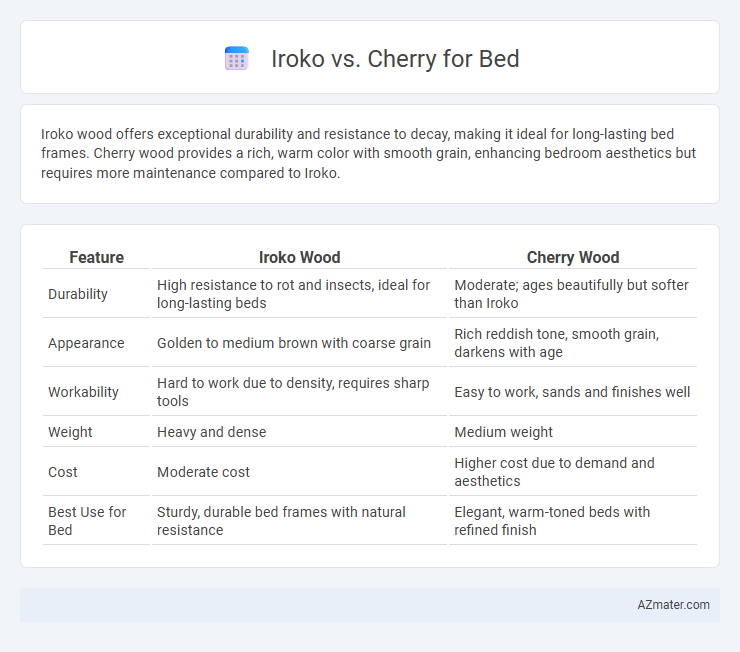Iroko wood offers exceptional durability and resistance to decay, making it ideal for long-lasting bed frames. Cherry wood provides a rich, warm color with smooth grain, enhancing bedroom aesthetics but requires more maintenance compared to Iroko.
Table of Comparison
| Feature | Iroko Wood | Cherry Wood |
|---|---|---|
| Durability | High resistance to rot and insects, ideal for long-lasting beds | Moderate; ages beautifully but softer than Iroko |
| Appearance | Golden to medium brown with coarse grain | Rich reddish tone, smooth grain, darkens with age |
| Workability | Hard to work due to density, requires sharp tools | Easy to work, sands and finishes well |
| Weight | Heavy and dense | Medium weight |
| Cost | Moderate cost | Higher cost due to demand and aesthetics |
| Best Use for Bed | Sturdy, durable bed frames with natural resistance | Elegant, warm-toned beds with refined finish |
Introduction to Iroko and Cherry Wood
Iroko wood, known as African teak, features a golden to medium brown hue with coarse grain and natural durability ideal for bed frames resistant to wear and pests. Cherry wood boasts a warm reddish-brown color that deepens with age, prized for its smooth texture and fine grain quality, offering elegance and strength for bedroom furniture. Both woods provide excellent stability and longevity, but Iroko excels in outdoor resilience while Cherry is favored for indoor classic aesthetics.
Botanical Origins and Distribution
Iroko wood, derived from the Milicia excelsa tree native to West and Central Africa, is valued for its durability and resistance to pests, making it a popular choice for beds in tropical regions. Cherry wood, sourced from the Prunus serotina tree native to North America, is renowned for its smooth grain and rich, reddish-brown color that deepens with age, commonly found in temperate climates. Both woods reflect their botanical origins and geographic distributions, influencing their availability, aesthetic qualities, and suitability for bedroom furniture.
Physical Characteristics Comparison
Iroko wood displays a coarse texture with interlocked grain, offering strong durability and natural resistance to decay and insect attack, making it ideal for bed frames requiring robustness. Cherry wood features a fine, straight grain with a smooth texture and rich reddish-brown color that deepens over time, valued for its aesthetic appeal and moderate hardness. Both woods provide excellent stability, but Iroko is heavier and denser, enhancing its structural strength compared to the lighter, more pliable Cherry.
Durability and Strength Differences
Iroko wood offers exceptional durability with its high resistance to decay and insect attacks, making it a strong choice for long-lasting beds. Cherry wood, while also durable, is softer and more prone to dents and scratches compared to Iroko, but it provides a beautiful, smooth finish. The dense grain structure of Iroko contributes to greater strength and longevity, whereas Cherry's moderate hardness ensures ease of craftsmanship but less resistance under heavy use.
Color and Grain Patterns
Iroko wood features a rich golden to medium brown color with a subtle yellowish hue that darkens over time, displaying interlocked grain patterns that create a coarse texture with occasional wavy or striped figures. Cherry wood offers a warm reddish-brown color that deepens to a rich, reddish mahogany as it ages, characterized by a fine, straight grain with occasional small knots and subtle curly or wavy patterns. The distinctive color evolution and grain variations of both Iroko and Cherry woods significantly impact their aesthetic appeal in bed construction, with Iroko presenting a more rustic, textured look and Cherry offering a smoother, elegant finish.
Workability in Bed Frame Construction
Iroko wood offers excellent workability in bed frame construction due to its moderate density and natural resistance to decay, making it easy to shape and finish while ensuring durability. Cherry wood provides superior workability with its fine, straight grain that sands smoothly and accepts stains evenly, ideal for detailed craftsmanship and elegant finishes in bed frames. Both hardwoods balance strength and machinability, but Cherry's consistent texture makes it particularly favored for intricate bed frame designs.
Finishing and Maintenance Needs
Iroko wood offers a natural oily finish that enhances durability and requires minimal maintenance compared to Cherry wood, which demands regular polishing to maintain its rich, warm hue. Cherry develops a deep patina over time but is more susceptible to scratches and surface wear, necessitating gentle cleaning and occasional refinishing. Iroko's dense grain and resistance to moisture make it ideal for low-maintenance beds, while Cherry beds excel in aesthetic appeal but need attentive care to preserve their finish.
Cost Analysis: Iroko vs Cherry
Iroko wood generally costs less than Cherry due to its abundance and faster growth rate, making it a budget-friendly option for bed frames. Cherry wood commands a higher price because of its rich color, fine grain, and slower maturation, which enhances durability and aesthetic appeal. Choosing between Iroko and Cherry involves weighing the cost difference against long-term value and style preferences for bedroom furniture.
Environmental Impact and Sustainability
Iroko wood, sourced from fast-growing African trees, offers a more sustainable option compared to cherry, which often comes from slower-growing hardwood species native to North America or Europe. The environmental impact of iroko is generally lower due to its rapid renewability and less intensive harvesting practices, whereas cherry's slower growth rate contributes to deforestation concerns. Both woods provide durability for beds, but iroko's sustainability profile makes it a preferable choice for eco-conscious consumers.
Which Wood is Best for Your Bed?
Iroko wood offers exceptional durability and natural resistance to decay, making it ideal for sturdy, long-lasting beds in humid environments. Cherry wood provides a smooth texture and rich, warm color that deepens over time, appealing to those who prioritize aesthetic elegance and fine craftsmanship. Choosing between Iroko and Cherry depends on whether durability and weather resistance or refined appearance and aging beauty are your primary considerations for a bed frame.

Infographic: Iroko vs Cherry for Bed
 azmater.com
azmater.com